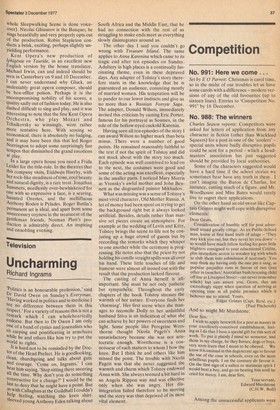Television
Uncharming
Richard Ingrarns 'Politics is an honourable profession,' said Dr David Owen on Sunday's Everyman. 'Having worked in politics and in medicine I see no difference between them in this respect. For a variety of reasons this is not a remark which I can wholeheartedly endorse. But then to Dr Owen I am only one of a band of cynics and journalists who sh carping and pontificating in armchairs While he and others like him try to put the World to rights. It is hard not to be reminded by the Doctor of the Head Prefect. He is goodlooking, Clean, churchgoing and talks about guts and courage. 'Come on, Ingrams,' I can hear him saying. 'Stop sitting there sneering all the time. Why don't you do something constructive for a change?' I would be the last to deny that he might have a point. But as with Callaghan at the Guildhall I couldn't help feeling, watching this keen shirtsleeved young Anthony Eden talking about South Africa and the Middle East, that he had no connection with the rest of us struggling to make ends meet as everything slowly disintegrates around us.
The other day I said you couldn't go wrong with Treasure Island. The same applies to Anna Karenina which came to its tragic end after ten episodes on Sunday. Adultery in high places is a continually fas cinating theme, even in these depraved days. Any adapter of Tolstoy's story there fore starts in the knowledge that he is guaranteed an audience, consisting mostly of married women. His temptation will be to pander to our lower instincts and give us no more than a Russian Forsyte Saga. The adapter, Donald Wilson, immediately invited this criticism by casting Eric Porter, famous for his portrayal as Soames, in the role of the hollow-eyed cuckold Karenin.
Having seen all ten episodes of the story I can award Wilson no higher mark than beta minus. There were a number of good points. He remained reasonably faithful to the text if not the spirit of Tolstoy and did not muck about with the story too much. Each episode was well contrived to lead on to the next, the costumes were good and some of the acting was excellent, especially in the smaller parts. I noticed Mary Morris as Vronsky's awful mother and John Bennett as the disgruntled painter Mikhailov.
What was missing was a sense of Tolstoy's most vivid character, Old Mother Russia. A lot of money had been spent on trying to get the background-right but it always looked artificial. Besides, details rather than massive set pieces create an atmosphere. For example at the wedding of Levin and Kitty, ,Tolstoy brings the scene to life not by conjuring up a huge crowd of guests but by recording the remarks which they whisper to one another while the ceremony is progressing. He notes also that the priest by not holding his candle straight spills wax all over his hand. These little touches of life and humour were almost all ironed out with the result that the production lacked flavour.
The casting of Anna herself is allimportant. She must be not only pathetic but sympathaic. Throughout the early chapters of the book Tolstoy stresses the warmth of her nature. Everyone finds her 'charming'. Her first scene when she manages to reconcile Dolly to her unfaithful husband Stiva is an indication of what she can achieve by her powers of sweetness and light. Some people like Peregrine Worsthorne thought Nicola Pagett's Anna unsatisfactory because she was not aristocratic enough. Worsthorne is a connoisseur of such matters to 'whom I bow the knee. But I think he and others like him missed the point. The trouble with Nicola Pagett was that she never suggested the warmth and charm which Tolstoy endowed Anna with. She always seemed a bit hard in an Angela Rippon way and was effective only when she was angry. Her disintegration failed therefore to be moving and the story was thus deprived of its most vital element.










































 Previous page
Previous page